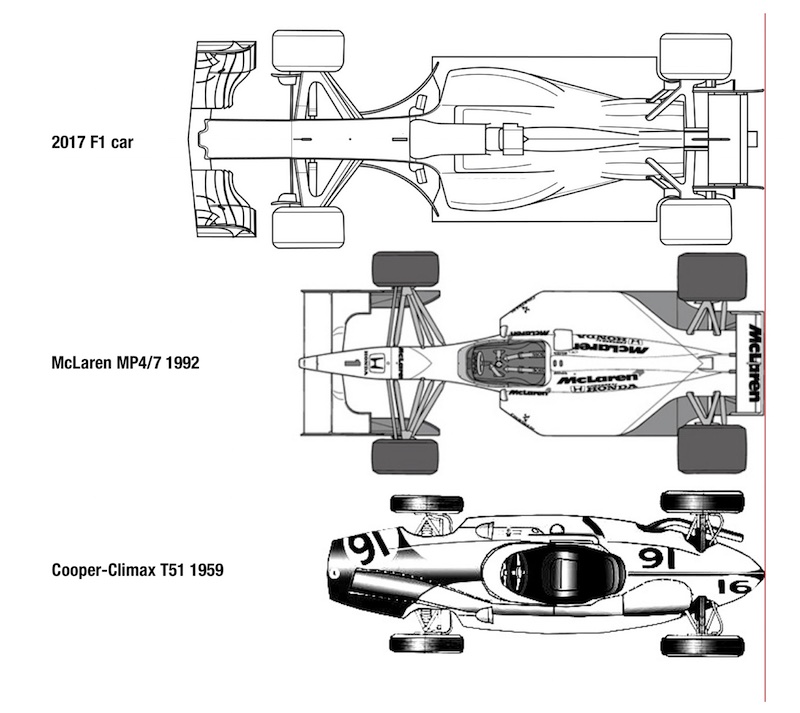
Dimensions of an F1 vehicle.
#1

Posted 12 July 2018 - 10:01
IMO, F1 should be small, nimble and overpowered. That would make F1 great again.
Advertisement
#2

Posted 12 July 2018 - 10:19
I did this a while ago.

Edited by Gary Davies, 12 July 2018 - 10:20.
#3

Posted 12 July 2018 - 10:31
#4

Posted 12 July 2018 - 10:33
#5

Posted 12 July 2018 - 10:33
In fact the first time I saw an F1 car close up in a museum, I was shocked by how small it was. I doubt that would happen with a 2018 version.
#6

Posted 12 July 2018 - 10:38
It's ridiculous how small those cars were back then. Like bobbycars. Much prefer the new, longer ones.
#7

Posted 12 July 2018 - 10:39
I have posted this fact on several occasions already but within this topic I suppose it fits.
A current F1 car is longer that the long wheel base versions of production limousines like the Mercedes S class, the BMW 7 series and/or about as long as Rolls Royses and Bentleys.
Besides that, there have been F1 cars that had a wheelbase that was longer that the entire length of nose tip to end of the rear spoiler of the early 70s Lancia Stratos world championship rally car.
Sorry `Buddyfan` but I have no American production cars in mind you might be more familiar with to compare ....
#8

Posted 12 July 2018 - 11:02
Current LMP1 cars are much bigger than the old group C cars, how do current Indycars compare to 1990's cars?
#9

Posted 12 July 2018 - 11:20
#10

Posted 12 July 2018 - 11:24
About current LMP1's longer than old Gp C cars, I think you are wrong with that.
The 919 was 465 cm long and 190 cm wide while I recall that GpC had a maximum width of 2 meter and length 4.8 meter.
#11

Posted 12 July 2018 - 11:27
A big part of the length of modern f1 cars is the large fuel tanks, I seem to remember that the 2009 cars were much nicer proportionally to the 2010 cars that suddenly got much longer with the refueling ban.
#12

Posted 12 July 2018 - 11:28
Current LMP1 cars are much bigger than the old group C cars
Not sure where you got that from, the Porsche 956 was 480 cm long and 199cm wide, the Porsche 919 is 465cm long and 190cm wide.
It's very close.
:Edit: As noted above. ![]()
Edited by Nonesuch, 12 July 2018 - 11:29.
#13

Posted 12 July 2018 - 11:30
Modern F1 cars look so ridiculous over rough kerbs/bumps. It's so long the thing flexes in the middle.
The teams asked for more wheelbase to 'accommodate all the extra bits and pieces with the hybrids', but now they have the packaging down to a tee there is no reason not to reduce the length. Except - the original motive was more to do with having more surface to play aero games with.
#14

Posted 12 July 2018 - 11:39
Not sure where you got that from, the Porsche 956 was 480 cm long and 199cm wide, the Porsche 919 is 465cm long and 190cm wide.
It's very close.
:Edit: As noted above.

Thanks for pointing that out Henri and Nonesuch, a trick of the eye no doubt, the 956 and 962 looked so small compared to the current Toyota.
#15

Posted 12 July 2018 - 11:45
On the drawing above, you can see that the maximum width of the car is only used for the floor, the sidepodes are nowhere near as wide.
As far as I can see, packing of hardware in the cars could easily been done if the cars were made at least one meter shorter.
Current cars are strechted to make them as narrow as possible at the rear for aero reasons.
But that means the cars can be given wider, (less aero efficient) sidepods again if they have to be that much shorter again.
As wide as like what whe saw in the Pre ground effects and ground effect era.
And within this aero era that won't happen....
Edited by Henri Greuter, 12 July 2018 - 11:46.
#16

Posted 12 July 2018 - 11:48
how do current Indycars compare to 1990's cars?


Not a great deal in length. The cockpit has moved back and up though.
#17

Posted 12 July 2018 - 11:51
#18

Posted 12 July 2018 - 12:16
Thanks for pointing that out Henri and Nonesuch, a trick of the eye no doubt, the 956 and 962 looked so small compared to the current Toyota.
I'm not a huge fan of the current LMP1s either. The Audi was worst, but they're all a bit bulky and have that rather silly dome-like cockpit. Also lots of cut-outs, straight lines - and that fin obviously doesn't help.
But anyway, as for F1 cars - they can easily drop a meter. And should be forced to by the FIA's regulations.
Edited by Nonesuch, 12 July 2018 - 12:16.
#19

Posted 12 July 2018 - 12:21
Advertisement
#20

Posted 12 July 2018 - 12:41
Another simple change overlooked by FIA to improve F1, these cars are out of proportion and are hurting racing with their absurd length. MF1GA
#21

Posted 12 July 2018 - 13:37
I'm not a huge fan of the current LMP1s either. The Audi was worst, but they're all a bit bulky and have that rather silly dome-like cockpit. Also lots of cut-outs, straight lines - and that fin obviously doesn't help.
But anyway, as for F1 cars - they can easily drop a meter. And should be forced to by the FIA's regulations.
I do not think size should be forced by regulations. Leave it free choice.
Instead they should put extremly tight hairpin somewhere on some track making this whales impossible to turn. And they will dissapear overnight
#22

Posted 12 July 2018 - 13:44
That's a lot of car to pass if you want to overtake it.
#23

Posted 12 July 2018 - 13:46
Current Indycar is as big as it was 25 years ago. It even looks almost the same.
They were longer than F1 cars in the 90s. They only needed to grow about 20cm to the current 5 meter Dallara.
sources:
https://en.wikipedia...ki/Penske_PC-23
https://www.indycar....-Specifications
#24

Posted 12 July 2018 - 14:43
#25

Posted 12 July 2018 - 14:57
A big part of the length of modern f1 cars is the large fuel tanks, I seem to remember that the 2009 cars were much nicer proportionally to the 2010 cars that suddenly got much longer with the refueling ban.
The size of the fuel tank is no bigger now than it was in the refueling era.
Edited by Boing Ball, 12 July 2018 - 15:10.
#26

Posted 12 July 2018 - 15:09
I do not think size should be forced by regulations. Leave it free choice.
Instead they should put extremly tight hairpin somewhere on some track making this whales impossible to turn. And they will dissapear overnight
They can already get round the Hotel hairpin at Monaco without any problem.
#27

Posted 12 July 2018 - 15:32
A big part of the length of modern f1 cars is the large fuel tanks, I seem to remember that the 2009 cars were much nicer proportionally to the 2010 cars that suddenly got much longer with the refueling ban.
But the 1992 McLaren in the comparison picture had to cover the same race distance without re fueling with an engine that was nowhere near as efficient.
The length is down to the aero as they seemed to increase in length at the start of 2017.
While I was at Williams HQ back in 2013 they had a FW11 and a FW34 in the lobby and the dimensions of the FW11 were much more pleasing.
Edited by 7MGTEsup, 12 July 2018 - 15:32.
#28

Posted 12 July 2018 - 15:35
The cars were smaller because the driver acted as the crash structure.
If you want to see how bad it got at one point, look at the cars from the early 80's. The drivers feet were well ahead of the front axle.
#29

Posted 12 July 2018 - 15:57
It is ridiculus how big those cars are. Never in history have they been so big. Like a whales of some sort.
IMO, F1 should be small, nimble and overpowered. That would make F1 great again.
Agree with that.
Imho the wheelbase should be regulated.
This piece of art had a wheel base of ~2,9m.

If i´m not mistaken, the wheelbase of the current Merc is about one meter longer.
Limiting it to, let´s say, 3,2m would be aesthetically much more pleasing.
It would also have the positive side effect, that the teams would also have to use more of the width of the floor as they´re losing space for their packaging solutions. Right now, roughly half of the floor is not used, which looks somewhat silly as well.
Edited by LiJu914, 12 July 2018 - 16:19.
#30

Posted 12 July 2018 - 16:00
This piece of art had a wheel base of ~2,9m. If i´m not mistaken, the wheelbase of the current Merc is about one meter longer.
Limiting it to, let´s say, 3,2m would be aesthatically , much more pleasing.
It would also have the positive side effect, that the teams would also have to use more of the width of the floor as they´re losing space for their packaging soultions. Right now, roughly half of the floor is not used, which looks somewhat silly as well.
It might just make more sense to regulate the total length of the car rather than the wheelbase. After all, the total width of the cars is regulated rather than the width of the suspension arms.
#31

Posted 12 July 2018 - 16:06
It might just make more sense to regulate the total length of the car rather than the wheelbase. After all, the total width of the cars is regulated rather than the width of the suspension arms.
Good point, but to be "safe" i'd regulate both, just in case some team would otherwise come up with an optical abomination due to expected aero gains.
Edit: btw. We already have a relative length limitation ("overhang" regulations), but they use both wheel centre lines as a reference. So limiting the distance of both centre lines (=wheelbase) would also limit the total length of the car.
Edited by LiJu914, 12 July 2018 - 16:16.
#32

Posted 12 July 2018 - 16:33
They can already get round the Hotel hairpin at Monaco without any problem.
Than we need a tighter hairpin.
#33

Posted 12 July 2018 - 16:58
Than we need a tighter hairpin.
No, and frankly we don’t need the cars to be any shorter. It’s not affecting the sport a great deal.
#34

Posted 12 July 2018 - 17:58
Typical dimensions in 1980s was 440 cm x 210-215 cm. Those proportions were much nicer.
And they had space for much bigger fuel tanks than today.
#35

Posted 13 July 2018 - 20:22
F1 cars used to be 15 cm wider than today and almost a meter shorter.
Typical dimensions in 1980s was 440 cm x 210-215 cm. Those proportions were much nicer.
And they had space for much bigger fuel tanks than today.
I'm guessing if they were wider, then racing at Monaco was even more difficult?
#36

Posted 13 July 2018 - 20:27
Given the amount of angst shown on these boards by folks wanting the cars to sound like they used to sound, look like they used to look, race like they used to race... that there would be a huge market for a multi-race series for folks plopped down in 1985 cars, no wait, 1995, no wait, 1965, no wait 2005, no wait 1975... Oh, that's the problem... people love the cars that were based on the formula when they became fans of the sport. And, that's highly variable. If you made a Retro F-1975 Series, only folks of a narrow age band would be attracted. The folks who were fans of the other decades would not be drawn to it.
Edited by BalanceUT, 13 July 2018 - 20:28.
#37

Posted 13 July 2018 - 21:24
It’s not the width, it’s the braking distance and ability to follow nose to tail through the corners.I'm guessing if they were wider, then racing at Monaco was even more difficult?
215 cm max. width was mandated in, IIRC, 1976, based on the then-widest car, McLaren M23.
Then the width was reduced to 2 m (so, the same as currently) in 1993. Then to 1.8 m in 1998 and back to 2 m in 2017.
#38

Posted 13 July 2018 - 21:28
Given the amount of angst shown on these boards by folks wanting the cars to sound like they used to sound, look like they used to look, race like they used to race... that there would be a huge market for a multi-race series for folks plopped down in 1985 cars, no wait, 1995, no wait, 1965, no wait 2005, no wait 1975... Oh, that's the problem... people love the cars that were based on the formula when they became fans of the sport. And, that's highly variable. If you made a Retro F-1975 Series, only folks of a narrow age band would be attracted. The folks who were fans of the other decades would not be drawn to it.
While this is true to a certain extent, there are still some aesthetical criteria and proportions that make an object more or less eye-pleasing.
Current cars may have their engineering justifications but their proportions are a bit unwieldy for my taste.
#39

Posted 13 July 2018 - 23:40
While I'm not a fan of the appearance of this generation of cars I'm not convinced their size is damaging the quality of racing. However if reducing their size results in less aerodynamic interference with other cars perhaps it is something to explore.
Advertisement
#40

Posted 14 July 2018 - 00:17
Modern F1 cars look so ridiculous over rough kerbs/bumps. It's so long the thing flexes in the middle.
The teams asked for more wheelbase to 'accommodate all the extra bits and pieces with the hybrids', but now they have the packaging down to a tee there is no reason not to reduce the length. Except - the original motive was more to do with having more surface to play aero games with.
Teams didn't ask for more wheelbase as that was never regulated to begin with. It simply makes more sense with the big fuel tank etc. to have a long car, in order to fit everything as close to the ground as possible. 20 years ago the chassis would have flexxed so much that it would probably have been impossible to construct such long cars, but with today's rules it's simply the quickest way.
But I agree they look a bit ridiculous, plus cars with shorter wheelbase would move around more so we would see more oversteer and spins, which are virtually absent in today's F1.
#41

Posted 14 July 2018 - 02:00
Teams didn't ask for more wheelbase as that was never regulated to begin with. It simply makes more sense with the big fuel tank etc. to have a long car, in order to fit everything as close to the ground as possible. 20 years ago the chassis would have flexxed so much that it would probably have been impossible to construct such long cars, but with today's rules it's simply the quickest way.
But I agree they look a bit ridiculous, plus cars with shorter wheelbase would move around more so we would see more oversteer and spins, which are virtually absent in today's F1.
I don't think it has anything to do with the larger fuel tank. The difference in the fuel-tank dimensions are nowhere near that large, when you actually compute them out.
It has likely a lot to do with technical regulation 3.5.5, which limits the forward extent of the floor (with respect to the rear face of the cockpit entry). With that rule, the only possible way to enlargen the underbody is to move rear wheels backwards (and fronts forwards to keep the weight balance).
This, obviously, has become an increasingly large (heh-heh) problem as the teams have become more skilled at extracting underbody downforce even from their flat floors. (With controlled air flow around the edges of the floor, to most likely mimic the effects of proper Venturi tunnels.)
That is—with current aerodynamical know-how and current rules—a longer car is aerodynamically favourable to a shorter car. (Within reasonable limits, obviously.)
That would also explain the creeping length. More know-how and better control of the air flow, and an increasingly longer floor becomes optimal. (The better structural engineering and materials are obviously a factor in this. No point making a 5+ metre car if it would either flex too much to be pushed to the limits, or be too heavy. But, of this is true, then I wonder what role the increased minimum weight has played in this game of limousines... A 600-kg car (with driver) cannot realistically be made as large as a 734-kg mammoth.)
Though, I am not an aerodynamics engineer. So, my “CFD eyes” might also be completely mistaken.
#42

Posted 14 July 2018 - 02:44
That is—with current aerodynamical know-how and current rules—a longer car is aerodynamically favourable to a shorter car. (Within reasonable limits, obviously.)
This was evident last (?) season with Ferrari that had a shorter wheelbase than Mercedes and it costed them as they relied more on wings downforce which produces more drag.
Supposedly, Mercedes and Red Bull were getting more downforce from the floor. This year the Ferrari has increased its wheelbase.
#43

Posted 14 July 2018 - 03:20
I've been wondering why the hell the length of F1 cars isn't regulated to something like 1992 levels. They are ridiculously long, and it looks shithouse.
#44

Posted 14 July 2018 - 03:45
isnt this partly related ro safety structures?
[assuming Indycar] Yep, the driver is up and back. Also notice that there is more structure in front of the front tires, and less in front of the back tires (more cushioning for a head-on collision). But, overall, the length is the same.
#45

Posted 14 July 2018 - 05:35
Look at the original Fiat 500/Mini and compare it to the 2018 versions...
#46

Posted 14 July 2018 - 06:53
Some of the size increase is down to extra safety!
Look at the original Fiat 500/Mini and compare it to the 2018 versions...
Most of the gains are indeed down to zero gains.
A 3.2m wheelbase limit sounds reasonable to me. The cars have become hideously long.
#47

Posted 14 July 2018 - 10:11
Teams didn't ask for more wheelbase as that was never regulated to begin with. It simply makes more sense with the big fuel tank etc. to have a long car, in order to fit everything as close to the ground as possible. 20 years ago the chassis would have flexxed so much that it would probably have been impossible to construct such long cars, but with today's rules it's simply the quickest way.
But I agree they look a bit ridiculous, plus cars with shorter wheelbase would move around more so we would see more oversteer and spins, which are virtually absent in today's F1.
#48

Posted 14 July 2018 - 10:26
I do not think size should be forced by regulations. Leave it free choice.
Instead they should put extremly tight hairpin somewhere on some track making this whales impossible to turn. And they will dissapear overnight
The height and width of the cars are already regulated, as is the bodywork in front of and behind the wheel centre lines. It'd just be adding one extra number to already extremely detailed set of regulations.
And more hairpins? For F1 cars? It's bad enough that so many tracks have 2nd and 3rd gear corners! ![]()
#49

Posted 15 July 2018 - 22:25
Oh yes, limit the width of the front wing to 150 cm and allow only one slit in there (two wing elements each side). But that’s for another topic.
Edited by boillot, 15 July 2018 - 22:35.
#50

Posted 16 July 2018 - 09:40
I read a few people saying this. A long wheelbase car (or narrow track, it's all relative) is well known to be more stable than a short wheelbase car. In 1998, the FIA made F1 cars narrow, and they got very long over the next 20 years. This affects the behavior of the cars, and how difficult they are to control, how nervous, twitchy, prone to oversteer and spin.If you watch a car from pre 1998, they are rather like big go-karts:
A shorter car would definitely be more 'snappy', but we shouldn't underestimate the strides that have been made in aero and suspension in that 20 years. I'd prefer them to be shorter, but I expect they'd still be on rails!






























